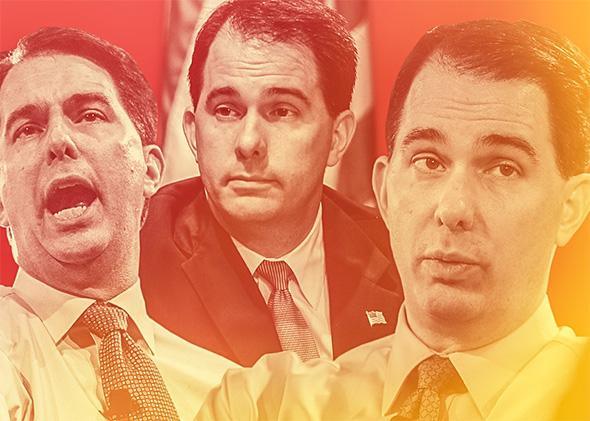Every presidential election cycle has its designated “flip-flopper,” the candidate attacked for his insincerity, inauthenticity, and lack of “resolve.” In 2004, it was Sen. John Kerry, who was famously for the Iraq war before he was against it. In 2008 and 2012, it was Mitt Romney, who went from moderate governor of liberal Massachusetts to an archconservative who hated universal health care, despite his pioneering role in making it a reality.
For this election, we might see flip-floppers on both sides of the partisan divide. In the six weeks since she started her campaign, Hillary Clinton has rushed to put distance between her positions and those of her husband’s administration. Where she was once tough-on-crime, she’s now for criminal justice reform. And where she was once a reliable vote for banks, she’s now a crusader for “everyday Americans.” On the other side is Wisconsin Gov. Scott Walker, who keeps running into trouble on immigration. On Tuesday, in an interview with Bret Baier on Fox News, Walker denied his shifts mattered for his relationship with voters. “There’s not a flip out there,” Walker said. “A flip would be someone who voted on something and did something different. I don’t have any impact on immigration as a governor or former county official.”
If Walker is desperate to avoid the label of flip-flopper—and it’s clear he is—it’s because we often disdain politicians who are too flexible on their positions and too transparent in their pragmatism. In choosing a president, voters weigh character, and politicians who switch positions—especially on big issues—tend to come up short. Throughout his 2012 campaign, Romney struggled to show his integrity, but the public never responded: Throughout the election, Romney held negative favorability ratings, and in one of the last polls of the season, just 45 percent of registered voters said the Republican nominee was “honest and trustworthy.” Forty-seven percent disagreed. Hillary Clinton has a similar problem: In a New York Times poll, just 48 percent of respondents said she was “honest and trustworthy,” compared to 45 percent who disagreed.
I understand the preference for firm leaders who don’t budge from positions and policies. It’s unsettling to think that a president (or a governor or a senator) would change her ideas or adjust her views on the basis of public opinion, political expediency, or pure opportunism. At the same time, this quality—the willingness and ability to “flip-flop”—is a vital part of presidential leadership.
The truth is that our best presidents—or at least our most successful ones—have been inveterate flip-floppers, willing to break from unpopular positions, move with political winds, and adjust to new complications.
The Abraham Lincoln who assumed the Oval Office in 1861 was a moderate on slavery who opposed immediate abolition and endorsed recolonization of freed blacks under a proposed plan of compensated emancipation. By his second term, Lincoln had become an emancipationist president who embraced black soldiers and floated black voting rights. These weren’t inevitable shifts. It’s easy to imagine a president (say, a President William Seward) who couldn’t respond to the shifting landscape of the Civil War, and who held the same course regardless of circumstances. But Lincoln, blessed with ambition, skill, and political agility, wasn’t that president. He listened to public opinion, abandoned ideas when they wouldn’t work, and adjusted on the fly. In other words, he flip-flopped. And he was a better president for it.
You can say the same for a few of his successors. Woodrow Wilson was a flawed president whose ultimate legacy is a live question. But one potential point in his favor is the decision to enter the war in Europe after running against American involvement. American troops broke the stalemate and helped end a catastrophic war that claimed millions of European soldiers and civilians. Decades later, Ronald Reagan would reverse himself on negotiations with the Soviets, opening talks on arms control and nuclear disarmament.
It’s true these particular presidents weren’t blowing with the wind. They were flexible, but in pursuit of concrete goals backed by serious convictions. That said, it’s hard to make that judgment at the time. From the perspective of a contemporary observer, it can look like the crass “flip-flopping” we decry. Likewise, perceptions are strongly influenced by outcomes. If Kerry had won the 2004 election, and successfully guided the United States out of Iraq, would we assail him as unprincipled? Or would we hail his wisdom and willingness to change?
Rather than malign flip-flopping, we should see it for what it is—a skill. And the best presidents can use it to further their goals or take advantage of new opportunities. The worst, by contrast, are doctrinaire and rigid—unwilling to move from positions they adopted under different circumstances, and resolute to the point of disaster.
Overall, most leaders are some combination of resolute and flexible. But on the main, we should encourage the latter over the former, and not worry if we’re looking at a leader’s authentic self. Who cares if Walker switched positions on immigration for the sake of the conservative base? What matters is he made a public switch that Republicans can point to and, if he’s elected president, use to hold him accountable. The same goes for Clinton. Whether she’s sincere about her shifts is irrelevant. What counts is that she’s committed to new positions in a serious way, which opens her to pressure from allies and activists.
Put another way, if inauthenticity and insincerity is what it takes for Hillary Clinton to be an effective president, then I’ll always take that over the alternative.
